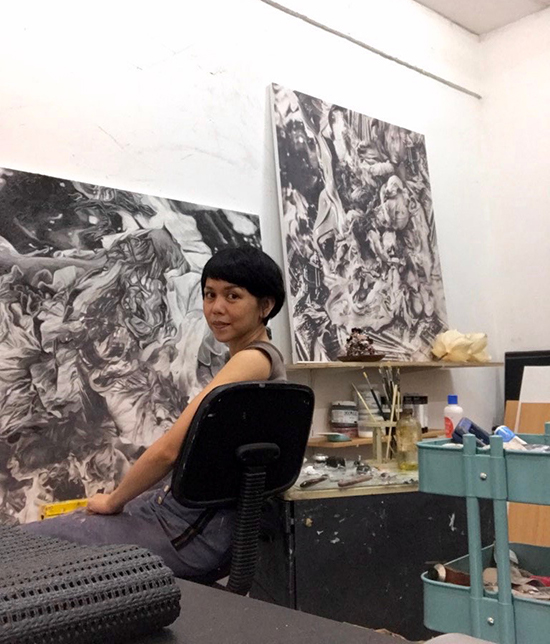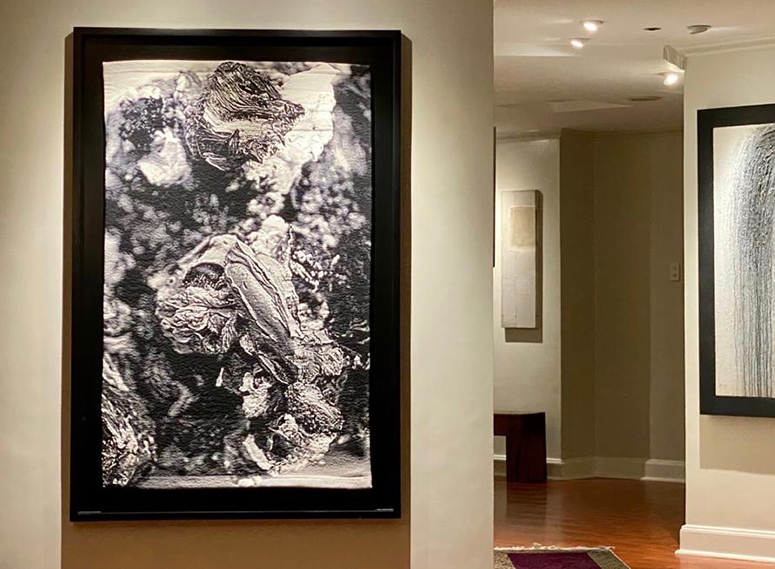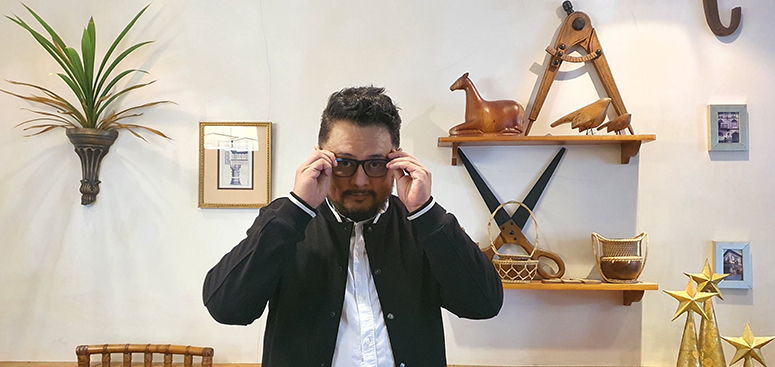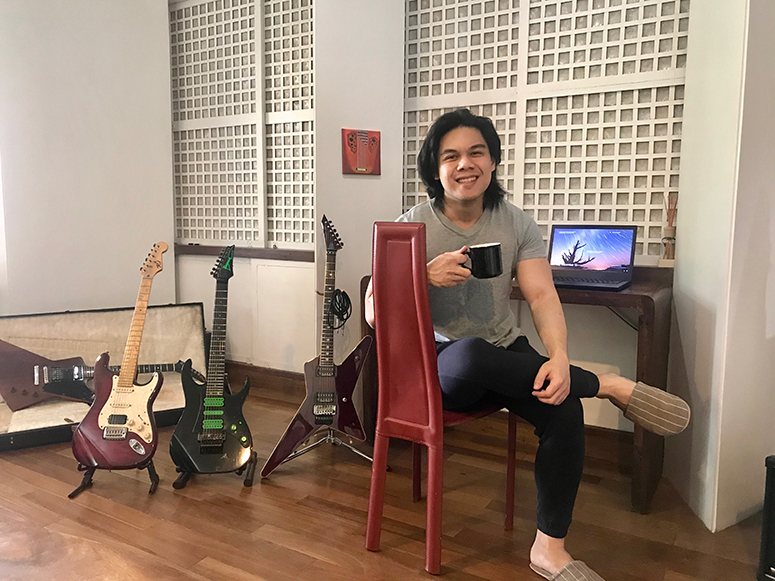Working from home away from home
Artist Patricia “Patty” Perez Eustaquio goes for a long walk before she starts on a painting, drawing, or sculpture. It’s research. She first takes photographs of things that inspire her. Flowers are familiar details in her work: she manipulates them, alters their integrity to challenge the viewer to a whole new meaning or perception.
For four months since the lockdown, Patty, who was a recipient of one of The Cultural Center of the Philippines’ Thirteen Artists Awards, and who has had several residencies and exhibitions abroad, could not go out of her Makati apartment for fear of COVID. Her apartment had no balcony. There were no flowers in sight. She felt trapped and could not get on with her art. When travel restrictions eased, she fled the city with her husband and dog to Tagaytay. There in the highlands, she reclaimed her freedom, and drew on her sketchpad again.

Patty is one of the many city dwellers who have been moving to the country en masse since the lockdown. The pandemic has exposed the downside to city living: the claustrophobia from all the concrete, the danger from density.
Real estate developers are also seeing an upturn in sales and inquiries for horizontal properties or village locations outside Metro Manila. Some Manileños, who have no roots in Canlubang and Lipa, have bought land there for future end-use. The growth during the pandemic has been faster than condominium sales, according to one major developer based in Makati.

A clean slate in Baguio
Tabula rasa. The idea of having a clean slate in a home far away from home was a thrill for interior designer Efren “Frenjick” Quesada when he moved from his Magallanes flat to a Baguio townhome in September. He had already bought a townhome a few years before the pandemic. Baguio, where he spent many summers, would be his retirement place. The virus just spurred his move, and the desire to reinvent himself in a different community with a distinct, bustling arts and culture scene.
Frenjick has not returned to Manila since September. He feels safer in Baguio. “Baguio’s residents and local government take COVID more seriously,” he says. There are strict processes. A website records and monitors the influx of tourists. The contact tracing is topnotch and consistent; for a long time, it had zero COVID infections.

Baguio has a soul, Frenjick declares. “I’ve seen it evolve and develop. Yes, it has changed and is no longer the Baguio of my childhood. But I can say the same for other cities with the influx of commercialism. And these cities have had it worse. Baguio continues to carve and protect its identity. Civic society, government and business are all working together to make it a progressive center for the arts.”
But Baguio is not his permanent home just yet. The retirement will happen in another five to 10 years. He still has a business to run. Design HQ, which Frenjick set up with his Japanese partner, has been working non-stop even during the lockdown. They employ 20 full-time workers, mostly designers who do bespoke homes, high-rise condos, hospitality and retail establishments. The business continues to thrive in spite of the boss running things remotely from Baguio.
“It was an easy transition. Unwittingly so, we were prepared for the pandemic, prepared to work from home (WFH),” Frenjick adds.
For 40% of the time, pre-COVID, the designers were out in the field, checking on the project sites, buying materials, and meeting with clients. The new arrangement, where one is measured on output, not on the number of hours spent at the desk, has lifted the quality of output. Clients, who are just as safety-conscious, now prefer virtual interactions.
The Zoom call had a myriad of challenges at the start of WFH setup, including the sudden hallway hellos from the household, and the crowing of the neighbor’s rooster. The CEO or manager was anxiously managing the technology and processing non-verbal cues. The delays, the silence, the dissonance, the seeming disinterest and obvious fatigue from staring onto a screen were unnerving for many. Frenjick took note of these and has since adapted to the new platform. How to sell a pitch entirely via Zoom remains one exciting challenge for a creative firm like Frenjick’s.
Moving to Batangas
For advertising writer Toby Kabatay of Grey Philippines, the Zoom call is not exactly the new best practice. “There’s only so much you can do with Zoom. Online, it’s hard to collaborate and brainstorm with agency people. Since it’s all WFH, I can’t go out for research, to observe consumer behavior.”
Toby’s dissatisfaction with WFH ends there. He loves his new life as a working man in their family home in Batangas City. Like Patty and Frenjick, he packed his bags and left the city, after being summoned by his mom to stay in Batangas temporarily until the situation got better. He hasn’t left the province since, except for a brief visit to terminate his lease and move all his stuff from Legaspi Village, Makati.

“I can’t complain. I’m blessed to be home with my family. There’s actually more work now. When I get stressed, I look out the window and stare at the fruit-bearing trees. I’m also better fed now. Plus, there’s a lot of barako coffee,” Toby quips.
Geography should still be inconsequential when the health crisis ends, according to Toby. He can see himself working out of Batangas most of the time and still advancing in his career. “Everything’s performance-based anyway. I just need to focus on my deadlines, my specific goals, and make my clients happy through my work.”
He hopes companies and the government will incentivize employees who wish to remain in the province. The fresh air, open spaces and absence of traffic make them more productive. It makes for a decongested Manila as well.
The digital revolution of several years back enabled most people to work from home. But the revolution was thwarted by fears that workers would slack off while in the comforts of their homes. The virus left employers with no other choice. The results have been positive, however. WFH could well be the new norm, post-pandemic.
Working from a provincial home away from another (urban) home is emerging as a sub-revolution. From the three profiles above, there is an interesting requirement for choosing to work in the country (reliable Wi-Fi connection is a given): the setting of choice must be accessible from Manila.
Working from a provincial home away from another (urban) home is emerging as a sub-revolution. There is an interesting requirement for choosing to work in the country: the setting of choice must be accessible from Manila.
Patty needs to visit her Makati gallery Silverlens occasionally. She has to come down from the mountains easily to replenish her art supplies.
Frenjick can be away from Manila 75% of the time. But he needs the 25% to catch up with key clients, and do the physical, tactile preparation of design details for critical projects.
Toby gets his creative juices flowing by interacting personally with like-minded advertising people. Besides, he sees himself adjusting personal boundaries, having occasional breaks from family and jovial Batangueños. Urban misery helps, sometimes.
For the most part, though, it’s country living that does wonders for quality of work and people’s well-being. Patty shares excitedly, “I found myself a cliff in Tagaytay in my earlier walks. It’s now my favorite spot. From there I can see lots of trees, the sky, the stars. Provincial life has been good for my health.”
Banner and thumbnail caption: Working entirely from home was a cinch for Frenjick Quesada’s firm.


